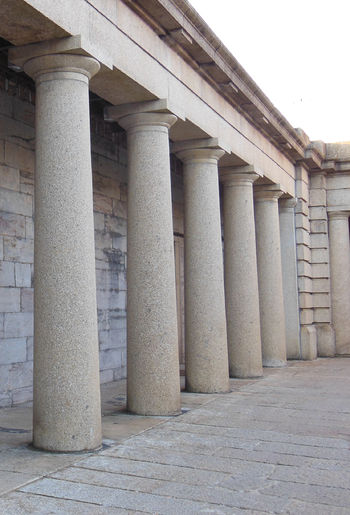Classical architecture: Difference between revisions
Jump to navigation
Jump to search


imported>Martin Wyatt (stub) |
imported>Martin Wyatt (added photo) |
||
| Line 1: | Line 1: | ||
{{subpages}} | {{subpages}} | ||
'''Classical architecture''' is that in the tradition of ancient [[Greece]] or [[Rome]] or of the classical revival in 16th century [[Italy]], deriving mainly from [[Palladio]]. In particular it refers to the design of buildings based, whether openly or by implication, on the five [[orders]] of [[columniation]], the corresponding [[pediment]]s, and the Roman [[arch]].<ref>Summerson, J. The Classical Language of Architecture. British Broadcasting Corporation. 1963.</ref><ref>Fleming, J, Honour, H, Pevsner, N. The Penguin Dictionary of Architecture. Penguin Books. 1966</ref> | {{Image|Colonnade r2.jpg|right|350px|Colonnade, of the Greek [[Doric]] [[order]]. with corner of [[rusticated]] wall in the background. The Doric order has been considered particularly suitable for military establishments.}}'''Classical architecture''' is that in the tradition of ancient [[Greece]] or [[Rome]] or of the classical revival in 16th century [[Italy]], deriving mainly from [[Palladio]]. In particular it refers to the design of buildings based, whether openly or by implication, on the five [[orders]] of [[columniation]], the corresponding [[pediment]]s, and the Roman [[arch]].<ref>Summerson, J. The Classical Language of Architecture. British Broadcasting Corporation. 1963.</ref><ref>Fleming, J, Honour, H, Pevsner, N. The Penguin Dictionary of Architecture. Penguin Books. 1966</ref> | ||
<references/> | <references/> | ||
Revision as of 15:18, 8 June 2013

Colonnade, of the Greek Doric order. with corner of rusticated wall in the background. The Doric order has been considered particularly suitable for military establishments.
Classical architecture is that in the tradition of ancient Greece or Rome or of the classical revival in 16th century Italy, deriving mainly from Palladio. In particular it refers to the design of buildings based, whether openly or by implication, on the five orders of columniation, the corresponding pediments, and the Roman arch.[1][2]